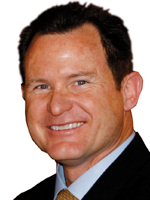Jackrabbit Homesteads
Whether rock climbing at “JT” or practicing law, it helps to have a buddy when you get stuck
By the time you read this, the Board of Directors of the Orange County Trial Lawyers Association will have had our annual Strategic Planning Retreat. As President this year, I had the unique pleasure of deciding where our Retreat would be held. This year, it was held in Joshua Tree, January 28-30. To me, this choice of venue was a no-brainer.
In the ’50s the government was giving away five-acre plots in the high desert, the so called “Jackrabbit Homesteads.” My grandfather, Bruce Kunkel, was a Navy pilot in World War II. He and my grandmother Helen originally hailed from Nebraska, but after doing some flight training here on the West Coast, they decided they liked the weather much better, and after the war, they settled in Long Beach.
My grandfather had decided to try his luck in real estate, and the idea of free land was enticing. There weren’t many other settlers out there in the early ’50s when Bruce obtained his five sandy acres through the Bureau of Land Management’s Small Tract Act. As a WWII veteran, my grandfather got priority in his application for the land, just a short distance from the Mojave Desert’s Joshua Tree National Park. Arid, undeveloped, and sparsely beautiful, the area was deemed “useless” by the federal government, and so was portioned out for mostly recreational use at $10 to $20 an acre. The sole requirement was that the applicant “proved up” the land with a small house. So, grandpa created the “Desertrest.”
Jackrabbit homesteads are only for folks who have a bit of pioneering blood in their veins. The land generally is rough, no water is immediately available, more or less road building has to be done. But fortunately, there are many Americans who find infinite pleasure in doing the hard work necessary to provide living accommodations on one of these sites – and cabins are springing up all over the desert country. What the Los Angeles Times called “one of the strangest land rushes in Southern California history” was over by the late ’50s.
One of my earliest memories occurred during the Cuban Missile Crisis. Believing nuclear annihilation was imminent, we were carted off to the high desert and hunkered down in the “Desertrest” awaiting the inevitable mushroom cloud. Later, we would go up to “Desertrest” practically every weekend. In the days before cell phones, all of us kids would tear out across the desert on our motorcycles, hike, rock climb, play with BB guns, and generally do what kids did before video games ruined everything. Somehow, we managed not to kill ourselves.
While finishing college, I would go up to “JT” with my college friends and we would rock climb all throughout the Joshua Tree National Park. On one very memorable occasion, I was free climbing with a good buddy, and for some reason decided to climb the notorious “Cap Rock” without any safety gear. Climbing up a small crack in the very exposed face, I got to a point where I realized I was stuck. I called to my climbing buddy and advised him of the dire situation I was in. He scrambled around to the top, which was about four feet above my head. He held his arm out and said, “Hold on, I will pull you up.” Doing so, I realized I would have to let go and just trust he would be able to pull me up. I grabbed his wrist, let go, and I fell to my death . . . No, that ending would suck. In reality, he pulled me up and over the edge.
[Warning – campy segue ahead.] Now, I know what you are thinking, having had to read through the bulk of this piece – “Doug, what in the world does all of this have to do with THE LAW?” Well, I have an answer.
OCTLA’s mission statement is “Take No Challenge Alone.” Since most of our members are solo practitioners or members of small firms, we all know the feeling of “climbing alone.” If my climbing buddy had not been there for me, I might still be stuck up on the rock, or worse. If my fellow OCTLA members were not there for each other in times of need, e.g., “Hey, I need intel on Judge Smith in LASC,” or “Hey, does anyone have a good motion in limine on sub rosa?” or “Hey, does anyone have any depo transcripts on this expert,” we would all, similarly, be stuck on a rock. Don’t let your fellow brothers and sisters in arms down. Don’t leave them out on that rock. Reach out your hand, offer assistance, and pull them up. It does not take much to be generous with your time, with your resources, and with your knowledge. Simone de Beauvoir said it best: “That’s what I consider true generosity: You give your all and yet you always feel as if it costs you nothing.”
Douglas Vanderpool

Doug Vanderpool is an “attorney’s trial attorney.” Often hired by his peers and former adversaries, Mr. Vanderpool develops novel theories and creative solutions to his clients’ legal needs. Opposing counsel learn quickly that Mr. Vanderpool is also happy to try cases and why clients hire him for his unique hands-on approach and extensive experience as a trial lawyer and strategist. One long-time client has said “hiring him was the best decision I ever made.” Mr. Vanderpool also likes long walks on the beach, pina coladas, and teddy bears.
Copyright ©
2025
by the author.
For reprint permission, contact the publisher: Advocate Magazine
